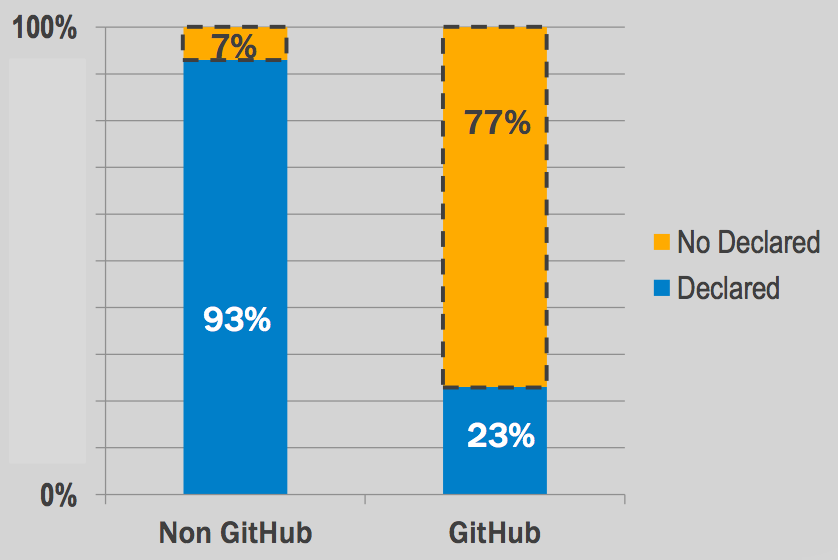
The younger generation of developers increasingly eschews formal licensing requirements for their GitHub projects, a trend Redmonk analyst James Governor calls “post open source software.” While some will celebrate a full 77% of GitHub projects going commando on licensing, new research from Black Duck Software suggests that this license-free approach comes with as much as $59 billion in hidden costs.
Developers Just Wanna Have Fun
For years the software industry has shifted from copyleft licenses like the GNU General Public License (GPL) to more permissive MIT and Apache Software Foundation-style licensing. The trend has become so pronounced that some question whether the GPL should even be taken seriously, particularly when applied to business. OpenGamma CEO Kirk Wylie, for example, heckles the free software set, arguing that the industry has moved on, with “top VCs [today] view[ing the] GPL as a worst case in all worlds: ideological founders or an unclear business model.”
But it’s not just the GPL which is seeing a decline.

As new research from Black Duck Software shows, today’s developers aren’t just moving away from the GPL. They’re moving away from open-source licensing altogether. Analyzing over one million projects on GitHub and other code repositories, Black Duck Software found that while 40% of open-source projects industry-wide carry no declared license, 77% of projects on GitHub have no declared license, open source or otherwise.
This is a much different landscape than that found on repositories such as Google Code or SourceForge, where licenses must be selected and used for hosted projects.
The Hidden Costs Of Licensing Freedom
Before you start celebrating the apparent defeat of The (Open Source) Man, consider that of these “license-free” projects a full 42% do come with strings attached in the form of embedded licenses. That is, such projects may incorporate other open-source projects with licenses and associated duties attached for the downstream developer.
As Black Duck found, many enterprises are shying away from projects without a declared license in order to minimize legal risk. Given that Gartner estimates enterprise end-user software spend at $342 billion in 2012, the cost of putting 400,000 open-source projects out-of-bounds for enterprises amounts to $59 billion in lost software savings.
As Black Duck’s director of developer marketing, Dave Gruber, pointed out to me (and Black Duck Software highlights in an infographic), it is estimated that 30% of software running in today’s enterprises is open source, saving companies an estimated $146B industry-wide. With 40% of today’s open source projects carrying no declared license, and the majority of organizations unwilling to use projects without a declared license, upwards of $59B (40% of $146B) of potential-use open source software is going untapped.
While this number is subject to debate, given that much of the unlicensed software in question might not be any good and hence wouldn’t be used whatever its license, the principle remains: no license will lead to less adoption which leads to more would-be adopters reinventing code they could otherwise use.
True, this isn’t the project developer’s concern. But it’s also true that all else being equal, developers want their code to be used.
Some enterprises will perform due diligence on these hidden embedded licenses and use the unlicensed software anyway. Others will use the software and pray it will work out. But perhaps most will simply avoid these apparently “license-free” projects, foregoing potential pitfalls and benefits.
Whether that cost is measured in billions of dollars of productivity lost or simply throttled adoption for a promising project, it’s significant and something GitHub could easily rectify by encouraging or requiring a license.
Image courtesy of Shutterstock.

















